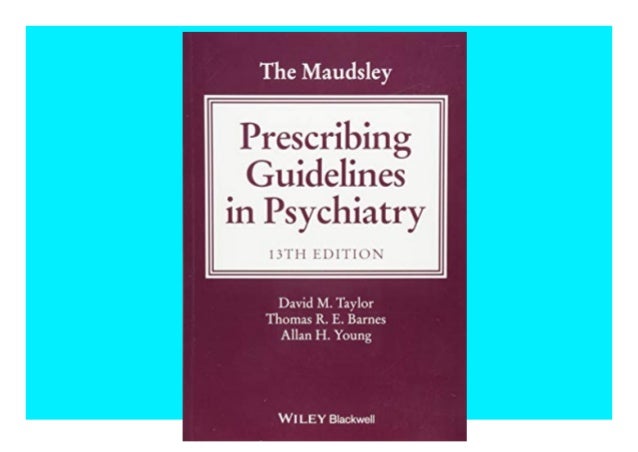Imagine a parent watching their child slip away, their vibrant spirit dimmed by the harsh grip of anorexia. Imagine the overwhelming helplessness, the desperate search for solutions, and the relentless worry that eats away at their soul. For countless families facing this heartbreaking reality, the Maudley Prescribing Guidelines represent a beacon of hope, a roadmap to recovery.

Image: www.slideshare.net
These guidelines, developed at the renowned Maudsley Hospital in London, offer a compassionate and effective approach to treating anorexia nervosa in adolescents. By focusing on family involvement and a collaborative approach, they empower families to take an active role in their child’s healing journey. This article dives deep into the world of the Maudley Prescribing Guidelines, delving into their history, core principles, and practical applications. We’ll also explore where to find the free PDF download, empowering you to embark on your own path to understanding and recovery.
The Genesis of Hope: Understanding the Maudley Prescribing Guidelines
The Maudley Prescribing Guidelines emerged from the groundbreaking work of Dr. Christopher Fairburn and his team at the Maudsley Hospital. They recognized the limitations of traditional approaches that often isolated adolescents and placed the burden of recovery solely on their shoulders. Instead, they embraced a family-based approach, recognizing that the family system plays a crucial role in both the development and the resolution of anorexia.
These guidelines go beyond simply addressing the eating disorder. They delve into understanding the complex interplay of factors contributing to anorexia, including biological predispositions, environmental influences, and the individual’s unique experiences.
Principles that Guide the Path to Recovery
The foundation of the Maudley Prescribing Guidelines rests upon several key principles:
-
Family-Based Therapy (FBT): This core principle is central to the Maudley approach. FBT emphasizes family involvement in all aspects of treatment, from meal planning to attending therapy sessions. Families learn to address the eating disorder collaboratively, fostering a sense of unity and shared responsibility.
-
Empowering Families: The guidelines recognize that parents are experts in their child’s life. They empower families to understand the condition, navigate challenging situations, and advocate for their child’s well-being.
-
Challenging the Eating Disorder: FBT actively confronts the eating disorder, recognizing its hold on the individual’s thoughts and behaviors. Through therapy, families learn to identify triggers, challenge unhealthy beliefs, and create a supportive environment that encourages healthy eating habits.
-
Individualized Treatment: The guidelines acknowledge that each individual and family is unique. Treatment plans are tailored to address specific needs, incorporating various techniques like cognitive-behavioral therapy (CBT), family therapy, and motivational interviewing.
Navigating the Complexities of Anorexia: Real-World Applications of the Maudley Prescribing Guidelines
The practical applications of the Maudley Prescribing Guidelines are vast and impactful. They provide a structured framework for families to navigate the challenging terrain of anorexia.
-
Mealtime Structure: Parents are guided to take charge of meal planning and preparation, ensuring their child receives adequate nutrition. They learn to create a supportive and non-judgmental environment at mealtimes, promoting a sense of normalcy and reducing anxiety.
-
Addressing Underlying Issues: Therapy sessions delve into the underlying emotional, psychological, and social factors contributing to anorexia. Families unpack family dynamics, explore past experiences, and develop coping mechanisms for stress, anxiety, and low self-esteem.
-
Building Healthy Relationships with Food: The treatment process focuses on shifting the individual’s relationship with food from one of fear and control to one of nourishment and enjoyment. Families learn to promote a balanced and healthy approach to food that prioritizes physical and mental well-being.
-
Empowering Recovery: FBT actively involves the individual in the recovery process, encouraging them to take responsibility for their health. It emphasizes self-compassion, acceptance, and the pursuit of individual goals beyond the eating disorder.

Image: www.medic4arab.com
Seeking Support and Accessing the Maudley Prescribing Guidelines PDF Free Download
The quest for knowledge and resources is a vital part of the recovery journey. The Maudley Prescribing Guidelines are available for free download, providing families with a valuable resource to guide their journey.
To access the PDF, a simple internet search using the keywords “Maudley Prescribing Guidelines PDF free download” will lead you to reputable sources like the National Eating Disorders Association (NEDA) or the Maudsley Hospital’s website.
Remember that while the guidelines provide valuable information, they are not a substitute for professional help. Consult with a qualified eating disorder therapist who is familiar with the Maudley approach to create a personalized treatment plan for your family.
Expert Insights: Navigating the Path to Recovery
Dr. Cynthia Bulik, a leading expert in eating disorders, emphasizes the importance of early intervention. She states, “The earlier the intervention, the more effective the treatment. The Maudley approach provides families with the tools and support they need to make a real difference in their child’s recovery.”
Dr. Gillian L. Peterson, a researcher focused on eating disorder treatment, shares her insights: “Family-based therapy is grounded in compassion and understanding. Families are encouraged to support their child’s recovery without judgment or blame, creating an environment that promotes trust and healing.”
Maudsley Prescribing Guidelines Pdf Free Download
https://youtube.com/watch?v=GzYLuPA-fjA
Empowering Yourself with Knowledge and Hope
The Maudley Prescribing Guidelines provide families with a profound understanding of anorexia, equipping them with the knowledge and tools to empower their child’s recovery. It is a journey that requires unwavering support, a commitment to learning, and a unwavering belief in the possibility of healing. As you embark on this journey, remember, you are not alone. The resources and support you need are out there, ready to guide your family towards a brighter future.
Don’t hesitate to seek help from trusted professionals and organizations like NEDA or your local eating disorder clinic. The path to recovery may be challenging, but with the right knowledge, support, and determination, you can create lasting change and help your loved one reclaim their life.






